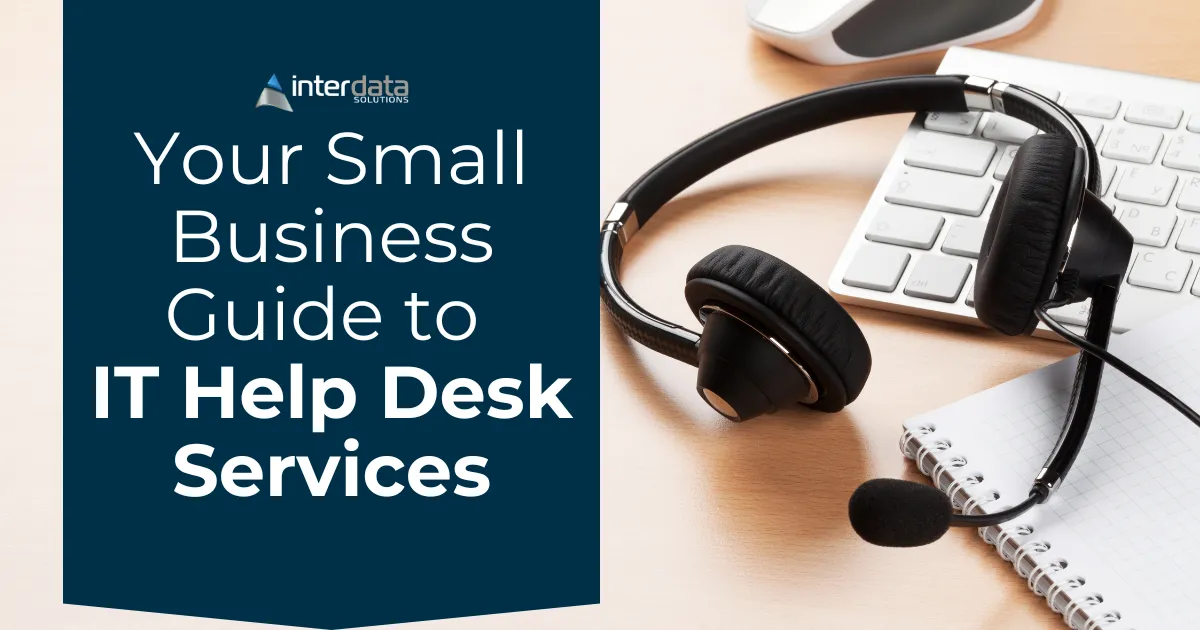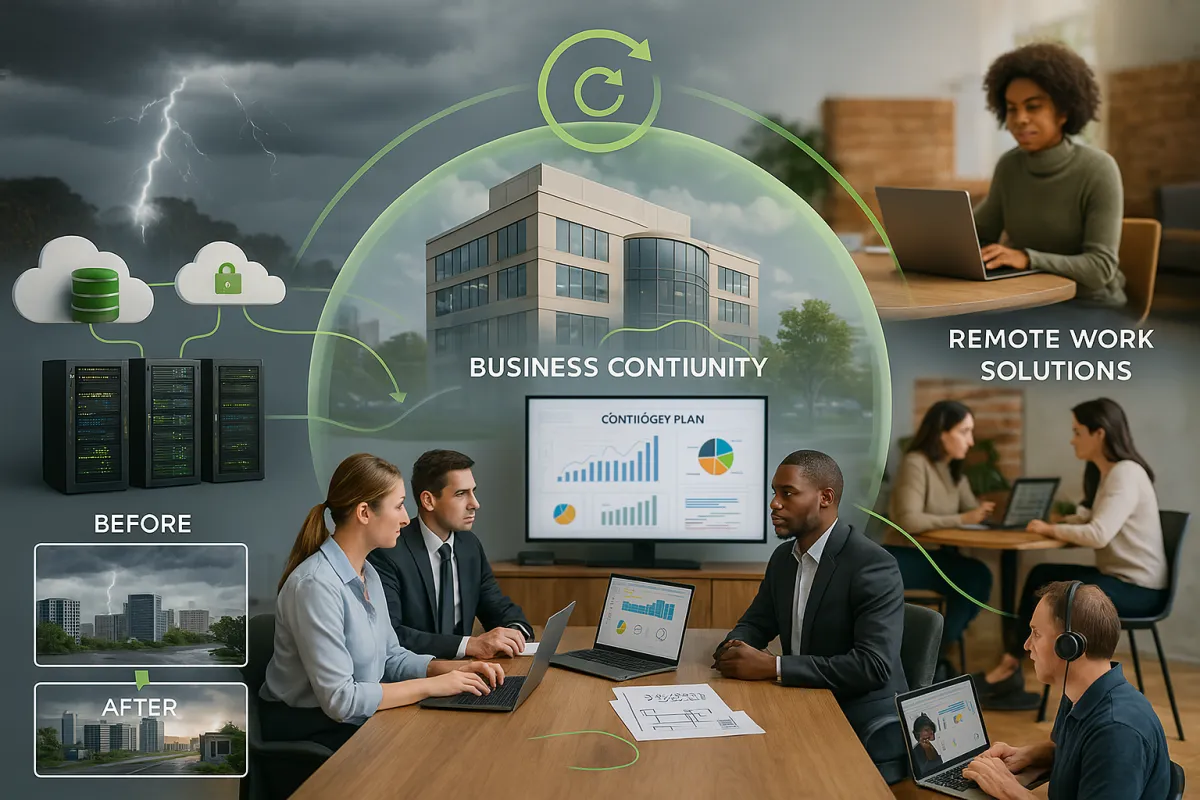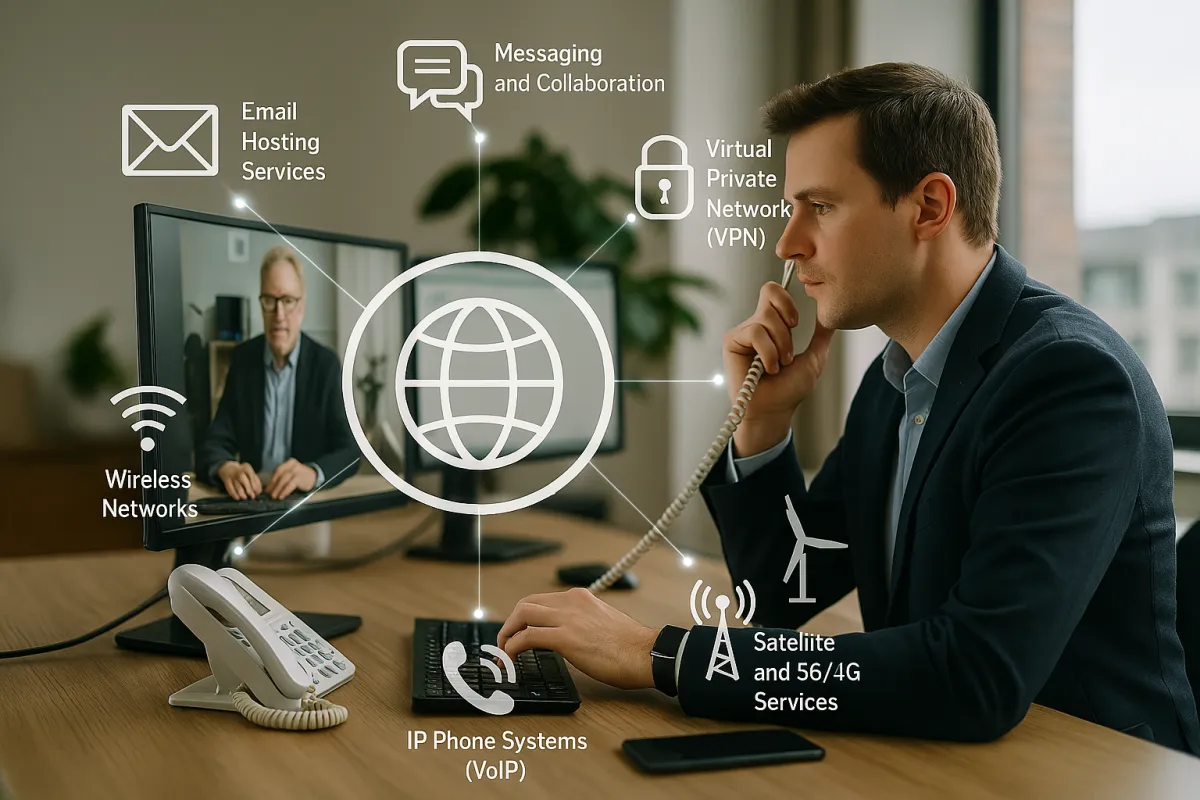"IT Solutions That Power Your Growth — Fast, Secure, and Tailored for Australian Businesses."
"We help SMBs scale with secure, responsive IT services that reduce downtime, simplify compliance, and strengthen cyber resilience."
"IT Solutions That Power Your Growth — Fast, Secure, and Tailored for Australian Businesses."
"We help SMBs scale with secure, responsive IT services that reduce downtime, simplify compliance, and strengthen cyber resilience."
Personalised, Reliable, and Ethical IT Services for Australian Businesses
Our Story:
Meet Hendrik van Zyl — Founder & Principal Consultant
Hendrik van Zyl, Founder — supporting Australian businesses since 1993
Personalised, Reliable, and Ethical IT Services for Australian Businesses
Our Story:
From humble beginnings in a home office over thirty years ago, we've built our company on a foundation of technical excellence and genuine care for Australian businesses.
What started as a passion project has evolved into a trusted technology partner for businesses across Australia, while maintaining the personalized approach only a family-owned operation can deliver.
We see our clients as extensions of our own family. Every solution we provide, every challenge we solve, strengthens relationships that transcend typical business partnerships—creating a community of growth, achievement, and shared success.
Our Services
Comprehensive IT Support
Multi-Channel Support
Dedicated Help Desk
Secure Customer Portal
Education & Training
Infrastructure Design & Build
Strategic Planning
Consulting Services
Change Managment
IT Budget Costing
Business Continuity Planning
Disaster Recovery Solutions
IT Resilience Planning
Data Backup and Protection
Business Impact Analysis
High Speed Internet.
Virtual Private Network (VPN)
Wireless Networks
IP Phone Systems (VoIP)
Identity and Access Management
Compliance and Governance
Network Security
Email Security
Security Awareness Education

Resources

IT Help Desk Services: A Cheat Sheet for Small Businesses
For many small businesses, technical issues can be a big struggle, causing downtime and hampering productivity. Frequent IT problems can lead to frustrated employees and dissatisfied customers, ultimately affecting the bottom line. We don’t want this case to be you.
This article aims to provide a comprehensive guide to IT Help Desk Services, offering insights into how these services can alleviate common technical challenges. By understanding the role and benefits of IT Help Desk services, small businesses can enhance their operational efficiency and customer experience.
What is an IT Help Desk?
An IT Help Desk is a dedicated service within an organisation that provides technical support and assistance to employees and clients. It handles headache-causing technical issues, ranging from simple tasks like password resets to complex network problems.
The primary functions of an IT Help Desk include troubleshooting issues, providing solutions, and ensuring the smooth operation of the company's technology infrastructure. By acting as a central point of contact, the IT Help Desk helps maintain productivity and resolve technical problems efficiently.
One key to effective IT Help Desk services is capturing detailed information at the outset. By using intelligent, form-based ticket submission systems, we ensure that all relevant details are provided upfront. This approach not only helps in resolving issues faster but also minimises the need for back-and-forth communication. For example, if a user reports a printer issue, the system guides them through potential causes, allowing our engineers to arrive prepared to fix the problem.

What’s the Difference Between a Help Desk and Service Desk?
IT Help Desk
An IT Help Desk is primarily focused on providing technical support and troubleshooting for end-users. The main role is to resolve immediate issues, such as hardware malfunctions, software glitches, and network problems. (Property management for your digital systems if you will.)
The Help Desk typically handles reactive tasks, addressing problems as they arise to ensure minimal disruption to daily operations. It serves as the first point of contact for users needing technical assistance and aims to resolve issues quickly to maintain productivity.

Service Desk
A Service Desk, on the other hand, has a broader scope and encompasses more strategic functions within an organisation. While it includes all the functions of an IT Help Desk, a Service Desk also focuses on managing and improving IT service delivery. It follows ITIL (Information Technology Infrastructure Library) practices to align IT services with business needs.
The Service Desk handles service requests, manages incidents, and oversees change management processes. It provides a more comprehensive approach to IT service management, ensuring that IT services support the overall business objectives.

What are the Key Benefits?
Have you ever come across a poorly functioning website? It’s slow, unproductive and frustrating. That’s why timely and effective technical support is essential because it ensures that users can rely on your business's technology without interruptions. This leads to improved customer satisfaction and loyalty, as clients feel supported and valued. To further exemplify this convenience, here are some key benefits:
Quick Issue Resolution: Fast and effective problem-solving minimises downtime and frustration for users, helping them get back to their tasks quickly.
Consistent Support: Regular and reliable support ensures that customers always have access to help when they need it, building trust and confidence in your services.
Proactive Assistance: An IT Help Desk can identify recurring issues and implement preventive measures, reducing the likelihood of future problems and improving overall service quality.
Enhanced Communication: Clear and timely communication from the Help Desk keeps customers informed about the status of their issues, reducing anxiety and increasing transparency.

Increased Productivity: By swiftly addressing technical problems, the Help Desk helps maintain productivity for both employees and customers, contributing to a smoother workflow and better business outcomes.
Customer Feedback: The Help Desk provides a channel for customers to give feedback, which can be used to improve services and address any underlying issues.

Features of IT Help Desk Services
Effective IT Help Desk services come with a variety of essential features designed to address and resolve technical issues efficiently. These features not only streamline support processes but also enhance the overall user experience. Key features include:
Ticketing Systems: Ticketing systems allow users to report issues and track the progress of their requests. This organised approach ensures that all problems are documented, prioritised, and resolved systematically.
Remote Support Capabilities: Remote support enables technicians to access and troubleshoot devices from any location. This feature reduces response times and allows for quicker resolution of issues without the need for on-site visits.
Knowledge Base Access: A comprehensive knowledge base provides users with self-service options to find solutions to common problems. This resource empowers users to resolve minor issues independently, reducing the volume of support requests.
Performance Monitoring: Continuous performance monitoring helps detect potential issues before they escalate. This proactive approach ensures that systems remain functional and that any anomalies are addressed promptly.
Automated Alerts: Automated alerts notify the support team of critical issues, enabling immediate action to prevent downtime. These alerts help maintain system reliability and ensure prompt responses to urgent problems.
Service Level Agreements (SLAs): Clearly defined SLAs set expectations for response and resolution times, ensuring that support services meet agreed-upon standards. This transparency builds trust and accountability.
User-Friendly Interface: An intuitive and easy-to-use interface for the Help Desk portal allows users to report issues and track their status effortlessly.
Reporting and Analytics: Detailed reporting and analytics provide insights into support activities, helping to identify trends, measure performance, and improve service delivery.

Common IT Challenges Solved by Help Desk Services
Small businesses often face a variety of IT challenges that can disrupt operations and hinder productivity. IT Help Desk services are designed to address these issues so that businesses can maintain uninterrupted work-flows. Here’s how Help Desk services can resolve them:
Technical Support and Troubleshooting
IT Help Desk services provide immediate technical support for resolving hardware and software issues. Whether it's a malfunctioning computer, software glitch, or network problem, the Help Desk can diagnose and fix these issues quickly.

Password Management
Password-related issues, such as forgotten passwords or account lockouts, are common in any organisation. The Help Desk can handle password resets and account recovery, ensuring employees regain access to their systems.
Network Connectivity Problems
Network outages or connectivity issues can severely impact business operations. Help Desk services can troubleshoot and resolve these problems, ensuring that employees have stable and reliable access to the network and internet.
Software Installation and Updates
Keeping software up-to-date is essential for security and performance. The Help Desk can manage software installations, updates, and patches, ensuring that all systems are running the latest versions and are protected against vulnerabilities.
Data Backup and Recovery
Data loss can be catastrophic for any business. The Help Desk can implement and manage data backup solutions, as well as assist in data recovery in case of accidental deletion or hardware failure, ensuring critical business data is always protected.
Security Incidents
Cybersecurity threats, such as phishing attacks or malware infections, require immediate attention. The Help Desk can provide quick response and remediation, reducing the impact of security incidents and safeguarding the organisation's IT infra structure.
For critical situations, such as cybersecurity incidents, having secure and reliable communication channels is vital. In addition to standard methods, we provide a secure back-channel through Signal, enabling our clients to connect with us in high-stakes scenarios. This added layer of security helps maintain trust and ensures that sensitive information is protected, even during emergencies.

Tips for Choosing the Right IT Help Desk Service Provider
Understanding the importance of help desk services is one thing; however, it’s a different challenge when it comes to picking out the right service provider. The following tips will guide you in making an informed decision, considering various factors that impact the quality of service.
Evaluate Service Level Agreements (SLAs)
Look for providers that offer clear and comprehensive SLAs. These agreements should outline response and resolution times, ensuring that the provider meets your business's specific needs and expectations.
Assess Response Times
Quick response times are essential for minimising downtime. Check the provider's average response times and ensure they can address urgent issues promptly. Fast and reliable support is a key indicator of a competent Help Desk service.
Check Expertise and Experience
Consider the provider's expertise and experience in your industry. A provider with relevant experience will be better equipped to understand and address your unique IT challenges. Look for certifications and qualifications that demonstrate their technical proficiency.
Review Customer Feedback
Customer reviews and testimonials can provide valuable insights into the provider's performance and reliability. Look for consistent positive feedback regarding their support quality, responsiveness, and overall customer satisfaction.
Ensure Scalability
Choose a provider that can scale their services as your business grows. Ensure they offer flexible solutions that can adapt to your evolving IT needs, whether it's increasing support capacity or adding new services.
Verify Security Measures
IT security is paramount. Confirm that the provider follows robust security protocols to protect your sensitive data and systems. This includes data encryption, secure access controls, and regular security audits.

Contact Interdata Solutions for IT Help Desk Services
In summary, IT Help Desk services are essential for small businesses to maintain smooth operations and enhance customer experience. These services provide critical technical support, resolving issues quickly and efficiently to minimise downtime and boost productivity.
Keep in mind, however, choosing the right IT Help Desk service provider involves careful consideration of SLAs, response times, expertise, customer reviews, scalability, support channels, and security measures. Therefore, it’s crucially important to be proactive while researching and shopping around.
That said, investing in IT Help Desk services can significantly improve your business's efficiency and customer satisfaction. To explore how these services can benefit your organisation, consider scheduling a free 60-minute consultation with our experts. Let us help you find the perfect IT Help Desk solution tailored to your specific needs.

Our Services
IT Support

Comprehensive IT Support
Proactive Maintenance & Monitoring
Multi-Channel Support
Dedicated Help Desk
Secure Customer Portal
Education & Training
Professional Services

Infrastructure Design & Build
Strategic Planning
Consulting Services
Change Managment
IT Budget Costing
SaaS

Cloud Data Protection - Microsoft 365, Google Workspace, Salesforce, Box, and Dropbox data
Windows, Mac & Linux Backup
Email Security
Anti-Virus & Anti-Malware
Business Continuity

Business Continuity Planning
Backup and Disaster Recovery
Remote Work Solutions
Communications

Email Hosting Services.
Messaging and Collaboration.
High Speed Internet.
Virtual Private Network (VPN)
Mobile Connectivity. Satellite and 5G/4G Services.
Wireless Networks
IP Phone Systems (VoIP)
Cybersecurity

Identity and Access Management
Compliance and Governance
Network Security
Email Security
Security Awareness Education
Continuous Cyber Risk Assessments
Resources
At Interdata Solutions, we understand the importance of staying ahead in today's dynamic business landscape.
That's why we offer valuable insights to our clients, providing them with the latest trends, market analyses, and expert perspectives tailored to the IT sector.

IT Help Desk Services: A Cheat Sheet for Small Businesses
For many small businesses, technical issues can be a big struggle, causing downtime and hampering productivity. Frequent IT problems can lead to frustrated employees and dissatisfied customers, ultimately affecting the bottom line. We don’t want this case to be you.
This article aims to provide a comprehensive guide to IT Help Desk Services, offering insights into how these services can alleviate common technical challenges. By understanding the role and benefits of IT Help Desk services, small businesses can enhance their operational efficiency and customer experience.
What is an IT Help Desk?
An IT Help Desk is a dedicated service within an organisation that provides technical support and assistance to employees and clients. It handles headache-causing technical issues, ranging from simple tasks like password resets to complex network problems.
The primary functions of an IT Help Desk include troubleshooting issues, providing solutions, and ensuring the smooth operation of the company's technology infrastructure. By acting as a central point of contact, the IT Help Desk helps maintain productivity and resolve technical problems efficiently.
One key to effective IT Help Desk services is capturing detailed information at the outset. By using intelligent, form-based ticket submission systems, we ensure that all relevant details are provided upfront. This approach not only helps in resolving issues faster but also minimises the need for back-and-forth communication. For example, if a user reports a printer issue, the system guides them through potential causes, allowing our engineers to arrive prepared to fix the problem.

What’s the Difference Between a Help Desk and Service Desk?
IT Help Desk
An IT Help Desk is primarily focused on providing technical support and troubleshooting for end-users. The main role is to resolve immediate issues, such as hardware malfunctions, software glitches, and network problems. (Property management for your digital systems if you will.)
The Help Desk typically handles reactive tasks, addressing problems as they arise to ensure minimal disruption to daily operations. It serves as the first point of contact for users needing technical assistance and aims to resolve issues quickly to maintain productivity.

Service Desk
A Service Desk, on the other hand, has a broader scope and encompasses more strategic functions within an organisation. While it includes all the functions of an IT Help Desk, a Service Desk also focuses on managing and improving IT service delivery. It follows ITIL (Information Technology Infrastructure Library) practices to align IT services with business needs.
The Service Desk handles service requests, manages incidents, and oversees change management processes. It provides a more comprehensive approach to IT service management, ensuring that IT services support the overall business objectives.

What are the Key Benefits?
Have you ever come across a poorly functioning website? It’s slow, unproductive and frustrating. That’s why timely and effective technical support is essential because it ensures that users can rely on your business's technology without interruptions. This leads to improved customer satisfaction and loyalty, as clients feel supported and valued. To further exemplify this convenience, here are some key benefits:
Quick Issue Resolution: Fast and effective problem-solving minimises downtime and frustration for users, helping them get back to their tasks quickly.
Consistent Support: Regular and reliable support ensures that customers always have access to help when they need it, building trust and confidence in your services.
Proactive Assistance: An IT Help Desk can identify recurring issues and implement preventive measures, reducing the likelihood of future problems and improving overall service quality.
Enhanced Communication: Clear and timely communication from the Help Desk keeps customers informed about the status of their issues, reducing anxiety and increasing transparency.

Increased Productivity: By swiftly addressing technical problems, the Help Desk helps maintain productivity for both employees and customers, contributing to a smoother workflow and better business outcomes.
Customer Feedback: The Help Desk provides a channel for customers to give feedback, which can be used to improve services and address any underlying issues.

Features of IT Help Desk Services
Effective IT Help Desk services come with a variety of essential features designed to address and resolve technical issues efficiently. These features not only streamline support processes but also enhance the overall user experience. Key features include:
Ticketing Systems: Ticketing systems allow users to report issues and track the progress of their requests. This organised approach ensures that all problems are documented, prioritised, and resolved systematically.
Remote Support Capabilities: Remote support enables technicians to access and troubleshoot devices from any location. This feature reduces response times and allows for quicker resolution of issues without the need for on-site visits.
Knowledge Base Access: A comprehensive knowledge base provides users with self-service options to find solutions to common problems. This resource empowers users to resolve minor issues independently, reducing the volume of support requests.
Performance Monitoring: Continuous performance monitoring helps detect potential issues before they escalate. This proactive approach ensures that systems remain functional and that any anomalies are addressed promptly.
Automated Alerts: Automated alerts notify the support team of critical issues, enabling immediate action to prevent downtime. These alerts help maintain system reliability and ensure prompt responses to urgent problems.
Service Level Agreements (SLAs): Clearly defined SLAs set expectations for response and resolution times, ensuring that support services meet agreed-upon standards. This transparency builds trust and accountability.
User-Friendly Interface: An intuitive and easy-to-use interface for the Help Desk portal allows users to report issues and track their status effortlessly.
Reporting and Analytics: Detailed reporting and analytics provide insights into support activities, helping to identify trends, measure performance, and improve service delivery.

Common IT Challenges Solved by Help Desk Services
Small businesses often face a variety of IT challenges that can disrupt operations and hinder productivity. IT Help Desk services are designed to address these issues so that businesses can maintain uninterrupted work-flows. Here’s how Help Desk services can resolve them:
Technical Support and Troubleshooting
IT Help Desk services provide immediate technical support for resolving hardware and software issues. Whether it's a malfunctioning computer, software glitch, or network problem, the Help Desk can diagnose and fix these issues quickly.

Password Management
Password-related issues, such as forgotten passwords or account lockouts, are common in any organisation. The Help Desk can handle password resets and account recovery, ensuring employees regain access to their systems.
Network Connectivity Problems
Network outages or connectivity issues can severely impact business operations. Help Desk services can troubleshoot and resolve these problems, ensuring that employees have stable and reliable access to the network and internet.
Software Installation and Updates
Keeping software up-to-date is essential for security and performance. The Help Desk can manage software installations, updates, and patches, ensuring that all systems are running the latest versions and are protected against vulnerabilities.
Data Backup and Recovery
Data loss can be catastrophic for any business. The Help Desk can implement and manage data backup solutions, as well as assist in data recovery in case of accidental deletion or hardware failure, ensuring critical business data is always protected.
Security Incidents
Cybersecurity threats, such as phishing attacks or malware infections, require immediate attention. The Help Desk can provide quick response and remediation, reducing the impact of security incidents and safeguarding the organisation's IT infra structure.
For critical situations, such as cybersecurity incidents, having secure and reliable communication channels is vital. In addition to standard methods, we provide a secure back-channel through Signal, enabling our clients to connect with us in high-stakes scenarios. This added layer of security helps maintain trust and ensures that sensitive information is protected, even during emergencies.

Tips for Choosing the Right IT Help Desk Service Provider
Understanding the importance of help desk services is one thing; however, it’s a different challenge when it comes to picking out the right service provider. The following tips will guide you in making an informed decision, considering various factors that impact the quality of service.
Evaluate Service Level Agreements (SLAs)
Look for providers that offer clear and comprehensive SLAs. These agreements should outline response and resolution times, ensuring that the provider meets your business's specific needs and expectations.
Assess Response Times
Quick response times are essential for minimising downtime. Check the provider's average response times and ensure they can address urgent issues promptly. Fast and reliable support is a key indicator of a competent Help Desk service.
Check Expertise and Experience
Consider the provider's expertise and experience in your industry. A provider with relevant experience will be better equipped to understand and address your unique IT challenges. Look for certifications and qualifications that demonstrate their technical proficiency.
Review Customer Feedback
Customer reviews and testimonials can provide valuable insights into the provider's performance and reliability. Look for consistent positive feedback regarding their support quality, responsiveness, and overall customer satisfaction.
Ensure Scalability
Choose a provider that can scale their services as your business grows. Ensure they offer flexible solutions that can adapt to your evolving IT needs, whether it's increasing support capacity or adding new services.
Verify Security Measures
IT security is paramount. Confirm that the provider follows robust security protocols to protect your sensitive data and systems. This includes data encryption, secure access controls, and regular security audits.

Contact Interdata Solutions for IT Help Desk Services
In summary, IT Help Desk services are essential for small businesses to maintain smooth operations and enhance customer experience. These services provide critical technical support, resolving issues quickly and efficiently to minimise downtime and boost productivity.
Keep in mind, however, choosing the right IT Help Desk service provider involves careful consideration of SLAs, response times, expertise, customer reviews, scalability, support channels, and security measures. Therefore, it’s crucially important to be proactive while researching and shopping around.
That said, investing in IT Help Desk services can significantly improve your business's efficiency and customer satisfaction. To explore how these services can benefit your organisation, consider scheduling a free 60-minute consultation with our experts. Let us help you find the perfect IT Help Desk solution tailored to your specific needs.


1300 130 931
Level 57, 19-29 Martin Place, Sydney NSW 2000
Monday - Friday, 9:00 am - 5:00 pm
© Copyright 2026. Interdata Solutions Pty Limited. All rights reserved.













